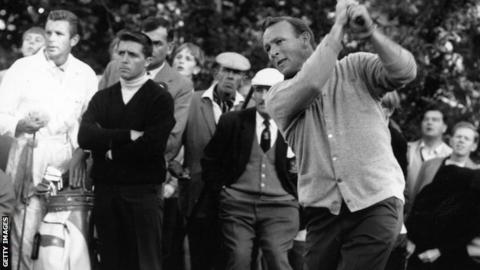
With another $6.3m up for grabs when the PGA Tour completes its Florida swing, it is an opportune moment to salute the prime architect behind such riches.
No-one did more to glamorise and popularise professional golf than Arnold Palmer, the 86-year-old host of the invitational tournament that bears his name and which starts at Bay Hill on Thursday.
Without his charismatic showmanship and commitment to the four majors, it is hard to imagine golf enjoying the status it does today.
Tiger Woods has been one of the world’s most eminent sportsmen in the last two decades, but the impact of the 14-time major champion’s brilliance would not have been so great without the foundations laid by Palmer.
Between 1958 and 1964 the man they called ‘The King’ won seven major titles and harnessed the new television era for golf as viewers fell in love with ‘Arnie’ and his heart-on-sleeve style.
He was followed by hordes of fans on both sides of the Atlantic, who became known as Arnie’s Army.
This was especially significant because Palmer continued to travel to the UK for The Open at a time when many American pros were finding the oldest major rather inconvenient.
But golf’s biggest hero embraced the journey across the pond and in doing so breathed new life into The Open.
The reward for his admirable perseverance was back-to-back Claret Jugs at Royal Birkdale and Royal Troon in 1961 and 1962.
That latter victory, at this year’s Open host, attracted the championship’s strongest field since the days of Bobby Jones and Gene Sarazen, and forever re-established the event’s place among the majors.
Jack Nicklaus may have come along to wrest the mantle of the sport’s leading player from Palmer, but his fame never waned. To this day you can order an ‘Arnold Palmer’ and the bartender will know to pour an iced tea with lemonade.
Even at the age of 86 he still ranks the fifth-highest earner in the game. According to Golf Digest’s latest figures, Palmer’s $40m income last year was beaten only by Jordan Spieth, Phil Mickelson, Woods and Rory McIlroy.
Mr Palmer, as the players refer to him, has always been an energetic ambassador for his event, conspicuous on the range, the course, in the clubhouse and the press tent. But, sadly, this year he is likely to be less visible.
“I don’t think his liveliness is quite there like it has been,” his grandson Sam Saunders, a PGA Tour player, recently told ESPN.
“The one thing that will never go away is his toughness. He’s not just going to lay down and not do anything. He’ll still be out there trying to push it.
“It’s a very busy week; there’s a lot of stuff going on. It’s tiring for me and I’m 28. At 86, he’s doing OK, but I think his availability to get out and be on the course and be seen as much will be limited.”
Although age is catching up with his grandfather, Saunders revealed Palmer’s eye for the game remains undiminished. “It’s amazing what he can still see and do.
“Every now and then, the words of wisdom that come out are mind-boggling. There are very few people in golf who know the game, physically or mentally, better than him.”
The stature of this golfing great helps attract what are always strong fields at Bay Hill. McIlroy chose to play there for the first time last year, principally to honour Palmer’s contribution to the game.
The Northern Irishman returns again this week for what will be his last strokeplay outing before next month’s Masters, and is joined in Orlando by Jason Day, Justin Rose and Henrik Stenson.
Australia’s Adam Scott is also in the field, bidding to become the first man to win three PGA Tour titles in a row since Woods collected five in succession in 2007-08.
Two years ago, Scott led for three rounds before a closing 76 handed victory to Matt Every.
The American retained the title 12 months later, so again enjoyed a congratulatory handshake with the exalted host behind the home green.
But no-one has been more successful there than the injured Woods, an eight-time champion who misses the tournament for the third year running.
Woods may not be there but, like all the PGA Tour’s events, it will still be screened nationwide and internationally.
This, in large part, is Palmer’s legacy, not solely for his part in making the game more popular, but also in the huge presence of America’s Golf Channel, which he co-founded in 1995 and which is currently available in 80 million US households.
The ultimate beneficiaries of Palmer’s legacy are the players themselves. This week, they will all make time for the grand old man of golf, and he will appreciate their gestures.
“All the guys coming to the tournament and seeing the familiar faces will definitely get his spirits up,” says Saunders.
It is the least they can do.



